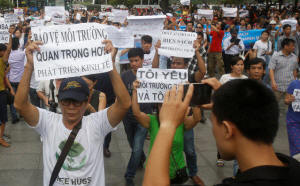|
Vietnam rights record puts Obama in a fix
as U.S. seeks new Asian alliance
 Send a link to a friend
Send a link to a friend
[May 20, 2016]
By Martin Petty and Matt Spetalnick
HANOI/WASHINGTON (Reuters) - With police
watching his home around the clock, Vietnamese blogger Huynh Ngoc Chenh
sneaked out through a back door and reappeared the next day in a public
square to hold a one-man, anti-government protest.
|

A security personnel (R) films Huynh Ngoc Chenh (L) holding a sign which
reads, "Protecting the environment is more important than economic
development" during a demonstration demanding cleaner waters in the
central regions after mass fish deaths in recent weeks, in Hanoi,
Vietnam May 1, 2016. REUTERS/Kham |
|
 But having been given the slip once, police wasted no time in
nabbing him after only five minutes. But having been given the slip once, police wasted no time in
nabbing him after only five minutes.
It was one of many free-speech experiments squashed by Vietnam's
communist government, underscoring the dilemma U.S. President Barack
Obama has ahead of a visit on Monday in which human rights will be
central to decisions about how far Washington is willing to engage
its former enemy.
Chenh got lucky. Unlike many dissidents, he was not arrested for
Sunday's demonstration in Ho Chi Minh City, which got him 12,000
Facebook "likes" for making a stand against what he calls an endemic
problem of abusive police.
"There are six men watching my house right now," said Chenh, 64, who
was escorted home and told to stay there.
"Sometimes, they stop me from leaving, other times they let me go
out but they follow me everywhere."
 His sit-in came as rights groups and activists accuse police of
using heavy-handed measures to stop protests held in cities the past
two Sundays to demand government answers over an unexplained
environmental disaster that caused mass fish deaths last month.
The timing of protests could not be worse for Vietnam. The White
House on Thursday said Obama was still grappling with a decision on
whether to lift a lethal arms embargo on Hanoi, one of the last
vestiges of the Vietnam War.
The United States has been clear that its removal hinges on progress
on rights.
Vietnam wants closer military ties and access to U.S. defense
technology as a deterrent against Beijing's assertiveness in the
South China Sea, over which the neighbors are bitterly at odds.
Though that fits in with the U.S. strategy of containing China,
Vietnam's jailing and intimidation of dissidents remains an obstacle
to Washington's push to turn its former enemy into its newest Asian
ally.
Obama's top Asia adviser Daniel Kritenbrink on Wednesday told
reporters human rights would be a key factor in "whatever arms sales
decisions we may or may not make".
Obama will not try to duck the issue. He is expected to meet
dissidents and will address human rights in Vietnam "both publicly
and in private", Kritenbrink said.
THORNY ISSUE
The issue is taboo for Vietnam's government, which did not respond
to Reuters questions about the extent to which rights improvements
had been made.
The United States has been watching closely and is familiar with the
Communist Party's boldest opponents, including Nguyen Quang A, an
intellectual who met U.S. Assistant Secretary of State for
Democracy, Human Rights and Labor Tom Malinowski last week.
[to top of second column] |

Quang A was among several dissidents named in a scathing,
documentary-like news report broadcast on state television on Sunday
that accused them of masterminding recent protests intended to
violently overthrow the government.
The arms embargo is contentious, with support in Washington for
countries threatened by China's rise, but misgivings about losing
leverage with Vietnam if too many concessions are given to a
government that New-York-based Human Rights Watch described in a
letter to Obama as "among the most repressive in the world".
Loretta Sanchez, a Democrat on the Congressional Caucus on Vietnam,
said the United States should be wary of "giving a free pass to a
government that continually harasses, detains and imprisons its
citizens".
Republican Senator John McCain, a former prisoner of war in Hanoi
who backed the easing of the embargo in 2014, said sales of
technology for Vietnam's maritime security should be unrestricted,
but the transfer of other arms should be case-by-case and linked to
human rights progress.
"There's still repression," McCain told Reuters. "Yes, there's been
improvement but there's still quite a way to go."
Obama will meet Vietnam's new president, Tran Dai Quang, who until
recently ran the Ministry of Public Security, a powerful police-run
agency that U.S. rights envoy Malinowski last year said "holds the
key" to how far U.S-Vietnam ties could advance.
But political analyst Le Hong Hiep said it was unlikely rights would
constrain ties that are strengthening rapidly, as the United States
had "other more vital interests" at stake.

"It remains an issue of low politics at a time when issues of high
politics such as strategic cooperation, and joint efforts to check
China's ambitions in the South China Sea, have been placed much
higher in bilateral agenda," he said.
(Editing by Robert Birsel)
[© 2016 Thomson Reuters. All rights
reserved.]
Copyright 2016 Reuters. All rights reserved. This material may not be published,
broadcast, rewritten or redistributed. |